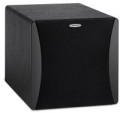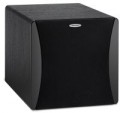Acoustic design
—
Closed type. The simplest type of construction: a closed (sometimes hermetically sealed) case with a speaker placed on the front panel. It is believed that such subwoofers have low sensitivity, which, however, is offset by high sound transmission accuracy and low distortion.
—
Phase inverter type. In the cases of such subwoofers, a tube is installed that has an outlet to the surrounding space. The length of the tube is chosen so that a signal comes out of it, inverted in phase relative to the signal from the front of the cone (in other words, from the main speaker). This improves the sound of the subwoofer and enhances the sound pressure. The disadvantage of a phase inverter is the additional noise from the sound stream in the tube.
—
With a passive radiator. A design similar to a phase inverter (see above) in terms of purpose and principle of operation, however, instead of a tube, such subwoofers use the so-called passive emitter. In fact, it is an ordinary speaker, devoid of a coil and a magnet and playing the same role as the phase inverter tube. The use of a passive radiator allows you to get rid of the noise of the air flow, characteristic of phase inverters.
Power
Rated power of the subwoofer. Technically, this is the highest average (rms) sound power at which the device can work normally (without sound distortion and damage to components) for an unlimited time. Simply put, the more powerful the subwoofer, the louder it is. The choice for this parameter depends primarily on the size of the space / room that is planned to be covered; detailed recommendations for different situations can be found in special sources.
Also, the power is directly related to the characteristics of the amplifier used with the subwoofer. For active subwoofers (see "Type"), this item actually indicates the nominal power of the built-in amplifier; the speaker itself can be more powerful, but it doesn't matter anymore. For passive models, the power rating corresponds to the highest amplifier power that can be connected to the speaker without the risk of damaging it at high volume.
Frequency range
The range of audio frequencies reproduced by the subwoofer. As a general rule, the wider the frequency range, the richer the sound and the more detail the speaker can convey. However, it is worth remembering that subwoofers as a class are designed for low and ultra-low frequencies in the range from 20 to 150 (sometimes 200) Hz. Therefore, in fact, a significant difference in sound is noticeable only with a large difference in the reproducible ranges (for example, 20-200 Hz and 50-150 Hz).
Also, do not forget that an extensive frequency range is not yet a guarantee of high-quality sound; and in some cases (for example, if the main speakers of the speaker also cope well with low frequencies), it may be completely redundant.
Speaker size
The diameter of the speaker(s) installed in the subwoofer.
It is believed that the larger the speaker (
15 ",
18 " and more), the more power it can produce and the deeper the bass will be on such acoustics. However, in modern subwoofers, manufacturers use various tricks that allow achieving good sound depth even with relatively small speaker sizes (
10 ",
8 "). Therefore, it is possible to compare different models only if they differ significantly in this indicator; and even then, in such cases, it is worth paying attention not so much to the speaker diameter as to the price category. The golden mean among sizes is
12-inch subwoofers.
Crossover frequency
Cutoff frequency of the crossover installed in the subwoofer (or supplied with it — for passive models, see "Type").
The crossover splits the audio signal into separate frequencies so that only the bass goes to the subwoofer and only the main range goes to the speakers. Such a device is mainly equipped with home models (see above). And the crossover frequency is the upper threshold of the frequencies fed to the subwoofer. This information is important for matching with the rest of the speakers: ideally, the lower threshold of the main acoustics should correspond to the upper threshold of the subwoofer, otherwise the frequencies will either overlap or dip in them (neither of which contributes to sound quality). For the convenience of matching, the crossover can be made adjustable (see above).
Passive speaker connection
Ability
to connect a passive speaker system directly to the subwoofer.
Only active models equipped with a built-in amplifier have this possibility (see "Type"). Such an amplifier in this case operates over the entire frequency range and is equipped with a crossover that separates the signal into a “bass” and main range. Bass is fed to the subwoofer's own speaker, and the rest of the frequencies are sent to the outputs for connecting passive acoustics. The role of the latter can be played by high-level terminals or Speakon connectors (see below), depending on the class and purpose of the subwoofer.
Anyway, this function allows you to do without an external amplifier for passive speakers, which is sometimes very convenient.
Remote control
A device that allows you to control the functions of the subwoofer from a distance — literally from the comfort of your sofa. Note that, unlike other consumer electronics,
the subwoofer remote control can be wired.

